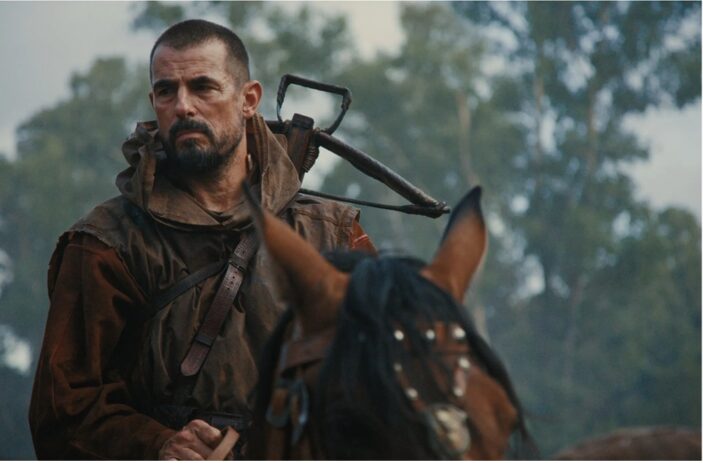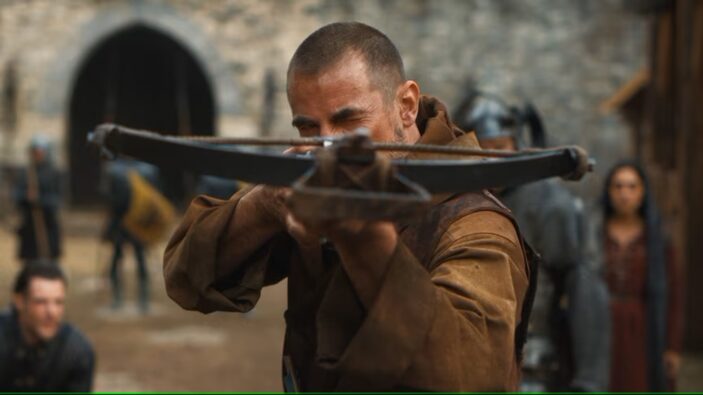
Regardless of what stories you’ve heard about William Tell, there’s one consistent note to his tale surrounding his son, a crossbow and an apple.
A legendary folk hero of Switzerland, his tale has been told many times across many mediums, and Danish actor Claes Bang is the latest to embody the legend. Under the direction of Nick Hamm, William Tell tells of 14th Century Switzerland, and the once peaceful hunter who leads his people in rebellion after his family and country are threatened by a tyrannical Austrian King. As the Holy Roman Empire crumbles, the quiet lives of the Swiss peasants are upended.
As the film arrives in Australian theatres, Peter Gray spoke with the actor about his knowledge of William Tell prior to starring in the film, the responsibility he felt in telling such a story, and how he sees it fit into his artistic journey as a whole.
How familiar were you with the legend of William Tell prior to the film?
There was a lot that I didn’t know. I knew, of course, what it seems everybody knows about him shooting an apple off his son’s head, but I did not entirely know why or how he got himself into that situation. I’ll be honest, and this is quite embarrassing, and say that I perhaps thought it was part of a travelling circus, or something where he was travelling the countryside, shooting an apple of his son’s head for money, or something like that.
But then, of course, what happened was that it was so much more than that, and there was a whole incredible story behind it. Which is this whole story of freedom. This liberation story. This story of standing your ground and kicking out the aggressor that wants to take over your land. And that played into the whole thing of me really getting interested in wanting to do this (film). I thought it was very interesting, that whole dilemma of “What do you do when someone wants to come and take over your land and your life?” Do you stand up and do something about it? Or do you not? And that whole thing moved into one situation and one character, and that was very, very interesting.
As old as the story is, it’s something that resonates with audiences today. Do you feel any responsibility in terms of meeting audience expectation, but also bringing your own interpretation to the character at the same time?
We were very aware that when we were shooting this movie, the Ukraine conflict was already happening. And while we were shooting, the Hamas Israel thing came on, and I think we absolutely felt a massive responsibility to say something meaningful. And I think we have tried our best.
I will say, this is an anti-war movie. I mean, the script ended the way it did, but it made even more sense to have it end the way it did, because it does become a story of “Will we ever learn anything?” What is this thing of an aggressor thinking they can come in and just claim what isn’t theirs? To shoot this story in this day and age and not be aware that this is going on in the world, that would have been quite crazy. We definitely felt a responsibility to say something that we thought was meaningful.
And the balance of heroism and humanity with this character. How did you navigate that?
That was actually easy, in a sense, because that was in the script. He’s seen war. He’s been in the crusades. And that’s made him very reluctant to go back. He says very firmly in that scene in the kitchen that if he goes back (to battle), he’ll die. A lot of people will die. They will lose families. And everybody in that scene, apart from himself, end up dead at the end. So that is the cost of it. And I think one thing that he’s also terrified of is that he knows what he will become if he goes out and joins the battle. He knows what kind of monster he will need to unleash in himself in order to put himself up for it. It’s this really interesting conflict of the character, and that’s his flaw in that sense. Well, he’s not flawed, but he knows that he will become that person again.
When we think of these stories, we immediately look at the physicality of it all. For you, was it the physicality or the emotionality that challenged you the most?
The thing that drew me to it was obviously the whole existentialistic nature of the character and his arc. I feel the physicality and the action and all the stunts becomes part of the storytelling, rather than the other way around. It’s sort of blended in and it helps the storytelling. It’s quite a brutal movie. The action sequences are quite brutal, and it really shows you the atrocities of the time. But I think it really works for the storytelling. I don’t think I could ever start the other way around. I would always start with the meaty business of the character. Everything will then blend into that.

Yeah, the brutality feels incredibly organic to the story. It never feels gratuitous in any way, which is always a good additive for these types of stories.
It was very important for Nick Hamm, the director, to get that level of brutality. There was a scene he filmed at the very beginning, I think it was because for scheduling reasons, but as it was being filmed we were still rehearsing. I remember he sat us all down and showed us a really rough cut of the scene that had been put together, and he wanted to show us all because it was the level of brutality he wanted. He didn’t want the brutality for fun, or because it was pretty, he wanted it because this is what happens when you go to war.
Did you explore much of the culture or the history of Switzerland as part of your preparation?
The thing is this story is not historical. It’s important to remember that it’s a legend. There’s bits and bops here and there, but nobody knows how exactly it all fits together. There’s not an exact sort of historical reference that you can (research). I feel what we did with (the film) was that we allowed ourselves the leeway with this legend. What I did do was a lot of crossbow training in order to familiarize myself with the instrument and the weapon. It really needs to come across as if he’s lived with that (weapon) for 40 years.
Well, I can attest that it looks like you hadn’t ever been without a crossbow in your hand.
Oh, my God. That’s nice. Thank you so much. That means a lot.
Did William Tell, as a character, teach you anything about or change the way you view resistance and heroism?
I think it’s still quite hard for me to get my head around what actually happens in that sort of centerpiece of the movie, in the apple scene. How do you go about making a choice like that? Putting your child at risk like that? I still don’t have an answer. That is also why this is a dilemma that is still something that people remember and know. People know this story for that reason, because you can never, ever quite understand why or how you would do and do something like that.
Hopefully this next question isn’t too deep as I wrap up, but, as an actor, how do you feel William Tell fits into your artistic journey as an actor, given everything you’ve done?
It was quite a deliberate choice to go and do this. I know there are people that couldn’t do this (role) because he’s “too mean” or couldn’t be seen in this way, but I actually really enjoy playing (villains). There’s always a bit more to play with. It’s more playful than when you’re just the straight shooter in the middle of the story. I think what’s interesting about (William Tell) is that even though he’s a hero, he’s flawed. There’s all these deliberations, all this doubt. It was definitely a deliberation on my side to be offered someone who at least had a moral compass.
William Tell is now screening in select Australian theatres. It will be available to rent or buy on digital platforms from March 10th, 2025.
